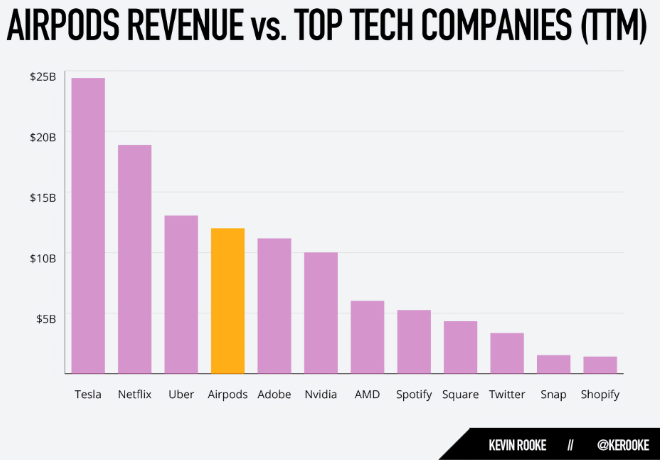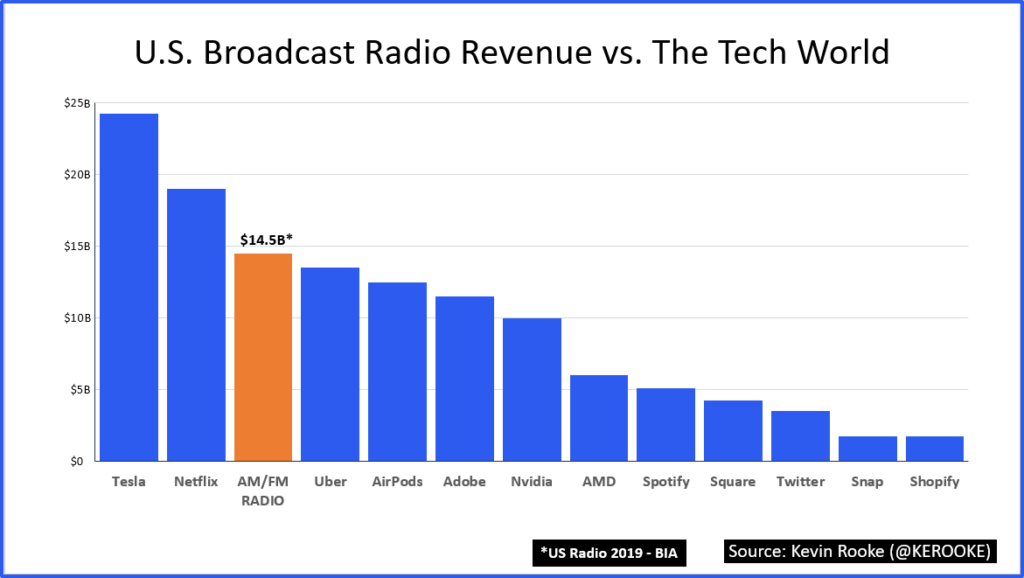
This headline stopped me cold the other day, but in the go-go tech economy, maybe it shouldn’t have:
Tesla is now worth more than Ford & GM – combined
That’s correct. A story in Ars Technica by Timothy B. Lee confirmed Tesla now has a net worth of $93 billion – more than GM ($50B) and Ford ($37B) put together.
That may seem counter-intuitive or even unfathomable for an automaker that’s sold only a fraction of the vehicles that Detroit’s Big Two has put on the road over the past 100 years. Not to mention Tesla’s roller coaster ride of events that always make the news.
But it’s a fact, at least in the eyes of the financial community.
And that’s why a recent story in Digital Music News jumped off the screen at me. An analysis by Kevin Rouke attempted to compare net revenue of a number of key tech brands – including Tesla.
Once again, Elon Musk’s amazing company is in the pole position with 2018 revenue of nearly $25 billion. The other media/tech brands included on his chart (and it may be a case of apples and grapefruits) pale in comparison – even Netflix.

And his point is summed up in the title of the story, written by Colin Cohen:
Apple Makes More Money From AirPods Than Spotify Makes From Its Entire Business
And AirPods are hot – experiencing what venture capitalists refer “hockey stick growth” these past couple years.
And that’s when I started thinking about how broadcast radio continues to be undervalued and overlooked amidst the glow and glory of these tech brands.
So, I took BIA’s estimated revenue for 2018 for AM/FM radio (in the U.S.) only – and made one addition: U.S. broadcast radio revenue.

This chart might surprise even more financial analysts than Rouke’s version, not to mention media buyers. And that’s because radio seems to always get the short end of the stick in virtually any conversation about media, entertainment, technology, and financial performance.
So, I was pleased to read the recent on-air comments attributed to Howard Stern in a passionate, rational defense of “radio” (he did not make the distinction between satellite and terrestrial), instead keeping his observations centered on the entire medium. His point was how the Golden Globes celebrate seemingly every nook and cranny of the entertainment industry.
Except for radio.
According to a story in Radar Online, Stern questioned why radio continues to be left on the outside when it comes up in so many media discussions. Here’s how they  quoted his conversation with Robin Quivers about the Golden Globes on Monday’s show:
quoted his conversation with Robin Quivers about the Golden Globes on Monday’s show:
Howard: “Why can’t they give out a couple of radio awards? Why is radio not entertainment?”
Robin: “It is entertainment. It is the forgotten, important medium.
Howard: “Like radio has big reach, millions of people listen to it. It’s a lot bigger audiences that films do. So, every once in a while, why don’t they have a radio category as opposed to a radio hall of fame where we are ostracized into some lame event?”
Radio awards in the Golden Globes? Indeed.
This, from a radio star who has excelled in the TV, motion picture, and publishing industries. And yet, his core is in radio, regardless of whether it is beamed down from a satellite or broadcast over the airwaves.
And in the rant, Stern referred to broadcast radio stars, like Rush Limbaugh, who would be deserving of recognition by the show business community.
Like all traditional media, broadcast radio has suffered its shares of bumps and bruises as a result of digital media disruption.
On a day like today, most of the radio buzz will be centered on iHeartMedia’s full-scale restructuring announcement, truly a tough day for the medium and seemingly, hundreds of industry pros in markets big and small.
But whether it’s audience size, revenue, or profits, the broadcast radio story continues to be both compelling and impressive for a medium that has enjoyed more years in business than Netflix, Twitter, Spotify, Uber, Square, and Shopify – combined.
Still, Howard Stern ought to be careful what he wishes for. An award on the Golden Gloves could produce the unintended consequence of Ricky Gervais filleting radio in front of a worldwide audience.
Still, I’m confident radio could take that punch.
- The Hazards Of Duke - April 11, 2025
- Simply Unpredictable - April 10, 2025
- Flush ‘Em Or Fix ‘Em?What Should Radio Do About Its Aging Brands? - April 9, 2025




There is one thing that separates radio from all of those other media – growth. Wall Street craves growth and its been 20 years since radio showed much. That whole graph is growth companies and one sore thumb – radio.
With apologies to Rodney Dangerfield, radio “don’t get no respect” from Wall Street because it does nothing to earn it. Flat revenue and firings every year to keep cash flow flat – when was the last time that strategy excited investors.
Golden Globes for radio? How many times could you nominate Rush Limbaugh, Elvis Duran, Ryan Seacrest and Howard? When was the last time a notable star surfaced in terrestrial radio? When you broom your entire bench, where is that next star going to come from?
And now, the big story is that even with better financial footing than in many years, iHeart (the company formerly known as cheap channel) has reacted to that new lease on life with the biggest mass layoff in its history. How can anyone credibly wonder why Wall Street is unimpressed? How many jobs, research projects and marketing campaigns could be saved if Bob Pittman just lowered himself to flying First Class? It must be so uplifting for all of the top execs to know that they survived to see another round of firings. “Daddy, what did you do at work today?”
Honestly, if radio wants to be seen as a co-equal with these other growth sectors, it needs to at least fake taking a stab at growth. In car company terms, its selling a stripped down version of a 1993 car – compare that to the products sold by the other companies on that graph.
Radio is really lucky to have the audience and revenue it does and should stop complaining that no one gives its 1993 car the respect of a Tesla. IT deserves the respect of a 1993 Impala.
Not a 1997 LeSabre? You mean to tell me Rush Limbaugh ≠ Meryl Streep, or Elvis Duran ≠ Judy Dench?
The growth argument is a valid one, Bob, but so is profitability. And while some of the companies on the chart make oodles of money, others are growing by spending gobs of money, failing to deliver a profit.
So, maybe the chart is apples and kumquats.
Thanks for the reality check, Bob.
Bob’s comments pretty much sum it up very eloquently.
Thanks for reading our blog, David.
I think radio’s numbers still prove to be solid overall but aren’t we comparing “apples” to “all other food combined” in the above chart?
The chart shows revenue for ALL AM/FM radio combined compared to a list of INDIVIDUAL companies. If we compared “all radio” to “all tech” or “all car manufacturers,” I’m afraid our industry would fare quite small in comparison.
That said, great idea of adding some radio categories to the Golden Globes–you gotta love the idea of what Ricky Gervais would do to us as an industry!
Yeah, Dave, I warned readers that the comparisons might be a bit shaky. But when I saw the original chart with Spotify, Uber, and a product like AirPods, I reasoned that anything goes. Note that I left out Jacobs Media revenue. 🙂
As for radio getting a Golden Globe, don’t hold your breath. Thanks for the comment.